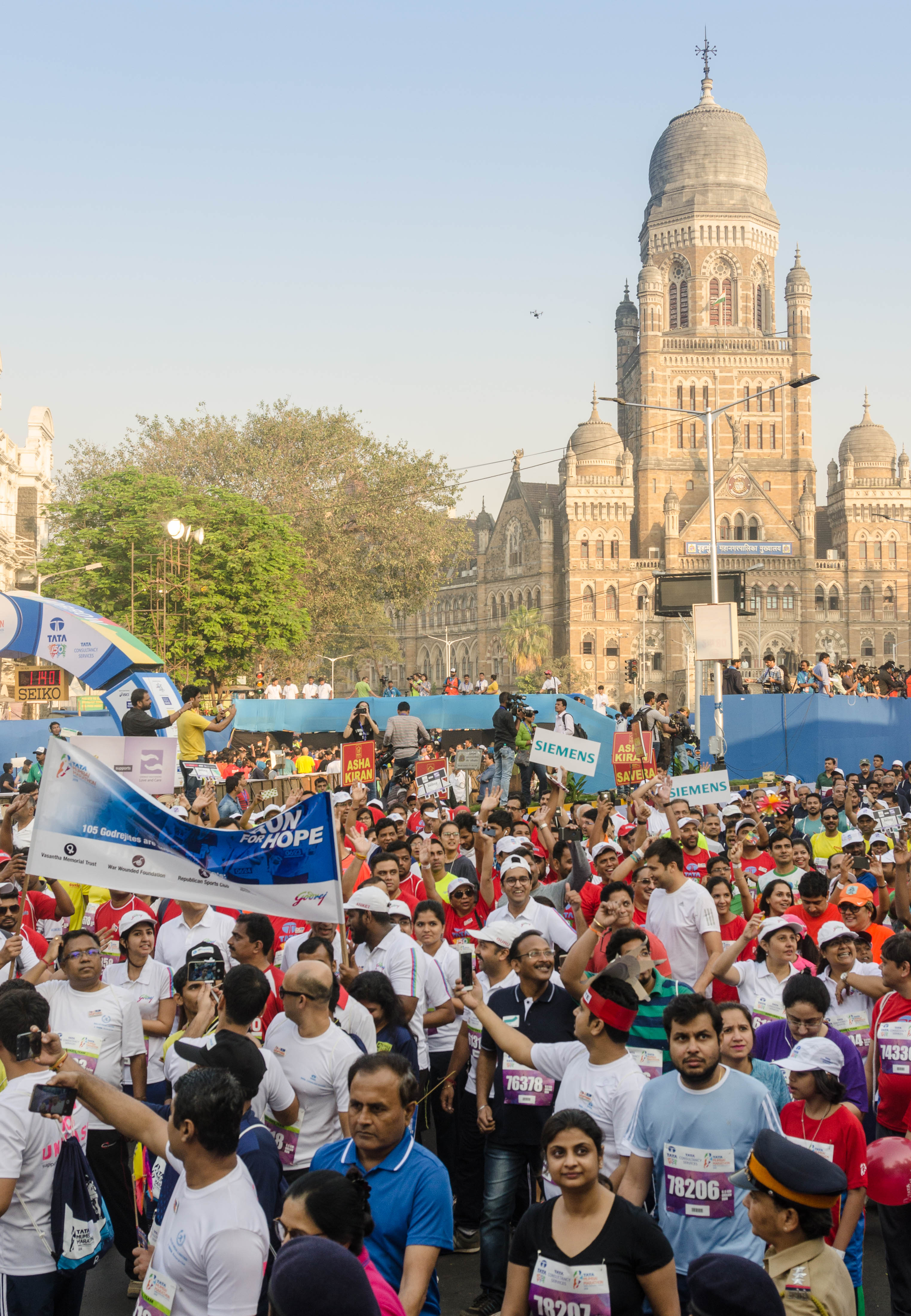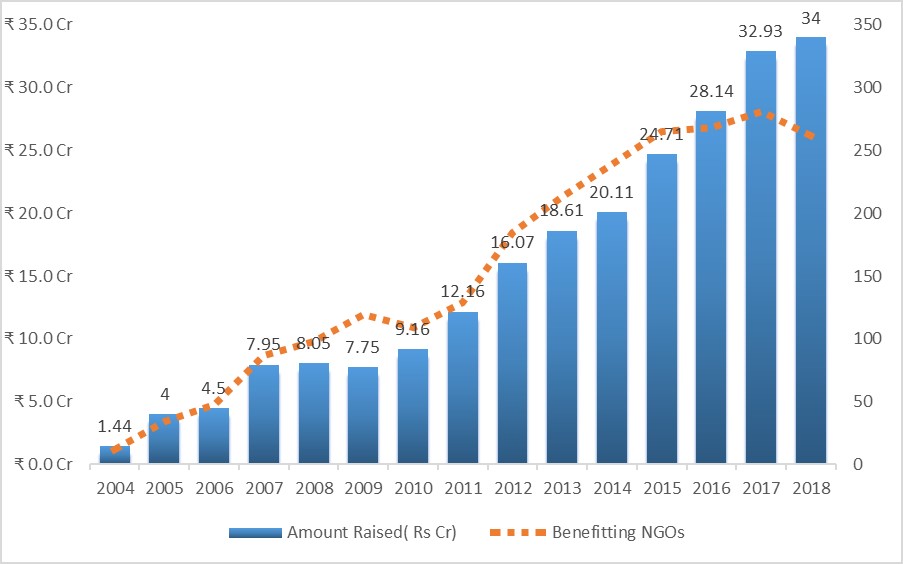Making a Popular Running Event
into a Large-Scale Philanthropy Platform

Participants at the start line of the Tata Mumbai Marathon 2018
Photo credit: United Way Mumbai
Summary
The Mumbai Marathon (TMM) is India’s biggest philanthropy platform. Over the years through a carefully managed charity structure, the event has been built as an enabler for hundreds of nonprofits to build relationships and raise funds for their causes. During its 15-year history, the TMM has raised more than 230 Crores (USD 35.4 million) for 564 nonprofits. Annually, the event raises more than Rs 34 Crores (USD 5.28 million), and with 4.25 percent average fundraising costs, it is the most effective and efficient fundraising platform for NGOs. As the event’s philanthropy partner, United Way Mumbai has three objectives for participating nonprofits:
- Help nonprofits raise funds from the event in an impartial, fair, and cause neutral manner;
- Build capacities of nonprofits through processes, training, sharing practices, and continuous support; and
- Increase visibility of their causes and facilitate the building of relationships between donors and participating nonprofits.
This article provides insight into how the event has evolved as a win-win platform and key enabler of relationships between nonprofits and potential donors, fundraisers, and corporate supporters.
Article
Early in the morning of the third Sunday of January each year, more than 45,000 people in Mumbai assemble at the start lines for India’s sport with the biggest participation -- The Tata Mumbai Marathon. A 42 km stretch of road passing through the most prestigious parts of the city is cordoned off for traffic for the various running categories. And for the better part of the morning, the city witnesses and celebrates the coming together of human spirit, endurance, and passion in support of social causes.
The Mumbai Marathon is also India’s biggest philanthropy platform for raising funds for various causes championed by nonprofit organizations in the country. The philanthropic partner of the event is United Way Mumbai (UWM). UWM is part of the United Way movement worldwide which is the world’s largest privately funded philanthropic network across 1,800 chapters in 41 countries. United Way Mumbai’s role as a philanthropy partner is to leverage the popularity of the event to build a platform for nonprofits to raise funds, increase supporters, and the visibility of their work. In the latest edition -- Tata Mumbai Marathon 2018, the event raised Rs 34.36 Crores (USD 5.28 Million) for 262 participating charities through the participation and support of 169 companies, more than 1,200 fundraisers, and more than 16,000 individual donors.

Mumbai Marathon Graph Chart
Growth of the Mumbai Marathon over the years in funds raised and participating charities.
Over its 15-year history the Mumbai marathon has raised Rs 230 Crores (USD 35.4 million) at a compounded annual growth rate of 23.55 percent for more than 600 nonprofits in India. Between 2004 to 2017 the event was known as the Standard Charted Mumbai Marathon and from 2018 onwards under the new title sponsor, the event became known as the Tata Mumbai Marathon (TMM). The event is promoted by a sports management company, Procam International Ltd. The success of the Mumbai Marathon has given rise to hundreds of other running events across the country over the years with similar philanthropic objectives embedded into the events. The inspiration behind the philanthropy pillar of the event is the historical linkage of running and supporting causes as espoused by other great city marathons across the globe, especially the London Marathon which pioneered running in support of a cause.
United Way Mumbai leverages the demand supply gap that exists between the limitation of the city’s infrastructural capacity, to not exceed 45,000 runners on the road, and the popularity of event to attract several times that limitation who want to participate. The intent is to provide participation opportunities to those individuals willing to contribute and support charitable causes.
The success of the philanthropy pillar hinges on several value propositions for all of the stakeholders of the philanthropic effort. There are three primary stakeholders: Nonprofit organizations or NGOs, corporate houses or institutions, and individuals. United Way Mumbai prepares and releases the guiding processes and opportunities with the event through a document known as the Charity Structure eight months in advance of the event date. The Charity Structure outlines the various avenues and categories through which participating charities may engage supporters to maximize their fund- and friend raising potential. All participating NGOs qualify as a registered NGO after clearing a legal and statutory due diligence process with UWM.
The charity structure also aims to maintain a cause neutral, fair playing field with equal opportunity to all credible nonprofits irrespective of size and cause. Additionally, the intent is also to keep the TMM as the most cost effective and efficient platform to raise funding. United Way Mumbai is committed to keeping the overall administrative cost of fundraising to below five percent and for TMM’18 this figure was at 4.25 percent.
There are three main categories through which funds can be raised: charity bibs, corporate participation, and individual crowd fundraising. The first two categories involve runners in the event while individual fundraising is open to all.
Charity Bibs
A certain number of running slots (bibs) for various race categories are reserved for participating charities. The charity bibs are distributed among the participating charities that are raising funds. Once the open category of the event is closed, the only way a runner can participate is by getting a bib from an NGO. NGOs often use the limited bibs they have in creative and innovative ways. There are also provisions for NGOs to get a second or third allocation of bibs subject to certain conditions. Charity bibs are a great way of introducing new donors and supporters to a charity and good NGOs leverage this connection to build a deeper relationship with runners.
Corporate Participation
The Mumbai Marathon is an excellent employee engagement and team bonding opportunity through the support of a cause activity. This category is especially designated for companies that wish to host employee teams to participate in the TMM and raise funds for charity. There is flexibility given to companies to structure their contributions to a charity of choice to enable them to be in line with their CSR objectives. More than 8,000 employees on 266 teams from 169 companies participated in TMM’18. The employee selection is determined by the companies that often run various internal employee challenges to allow employees to earn a spot on the team. Corporate teams on race day are hosted in a special tent to support a specialized team experience and they enjoy priority Dream Run line up preference over the general categories. There are also various incentives in place for companies and employees to fundraise for charity.
Individual Fundraising
Committed people raising funds for their causes are the backbone of the philanthropic effort at the TMM. UWM supports these individuals in this endeavor by providing an efficient, empowering, and effective crowdfunding platform to raise funds for a charity.
Fundraisers are segmented into two main categories, adults and young leaders (under the age of 21). There are seven gamified levels of fundraising with a set of incentives and privileges to encourage and motivate them to stretch their efforts. The fundraising pages are personalized and feature options that allow fundraisers to customize appeals, set targets, receive donation notifications and updates, and enable easy sharing on social media.
Most importantly, 100 percent of all online donations received on the fundraiser pages are disbursed in full to the NGO supported by the individual. UWM absorbs all payment gateway charges for online donations to ensure all funds raised online reach the chosen NGO.
The key driver in helping NGOs utilize the platform well is in investing in the capacities of the participating NGOs to leverage the technology easily, efficiently, and conveniently. Through various capacity building measures like workshops, meetings, helplines, sharing of best practices, and weekly check-ins, NGOs are guided through the event timelines. Also, put into place are various incentives, privileges, and capacity building grants to incentivize NGOs to use the platform more effectively.
The main challenge that United Way Mumbai faces with delivering on the philanthropic potential of the platform is the problem of scale. At the heart of any endeavor of this magnitude is the ability to personalize attention, provide support, and motivate stakeholders to greater achievements. With the increasing number of NGOs, corporate sponsors, fundraisers, and donors, it becomes increasingly more difficult to provide enough support with a very small team. UWM actively relies on various technological solutions to automate most administrative tasks as effectively as possible which allows the team to focus on human interaction. Smaller NGOs are often the most in need on the capacity building front, while the larger NGOs require greater operational support. The charity structure also staggers the category implementations in order to help organizations focus on particular aspects at any given time.
Over the years the Tata Mumbai Marathon has cemented its place as one of the most important fundraising avenues for nonprofits generating immense goodwill through its event. Apart from the funds raised for the development sector, it also raises awareness, connects people to causes, and highlights the work done by charities to the public.
Race day on the third Sunday of January is a riot of colors, people, and social crusaders. Citizens line the streets to encourage runners and support the causes being espoused. Participants, often carrying social messages, bring attention to the causes they support. It is often mentioned that the generous spirit of Mumbai comes out on full display in the streets during the race -- it is a celebratory moment for the city. Though the race is over by late morning, the social impact of the event reverberates in the lives of the beneficiaries touched and helped through the utilization of funds and the supported work of all of the participating charities.
Author bio
George J Aikara is the Chief Operating Officer at United Way Mumbai. He has lead the Philanthropy Partnership with the Mumbai Marathon for the past seven of the nine years of UWM’s association with the event, taking it from Rs 12.16 Crores (USD 1.87 million) in annual fundraising to its current Rs 34.36 Crores (USD 5.28 million). George is a strong advocate of using technology for social good and is passionate about building organizational capacity through processes and human talent development.
He has a strong interest and inclination towards furthering philanthropy, sustainable community initiatives, and organizations supporting the development of social enterprises. George is also a United Way Worldwide global fellow.


